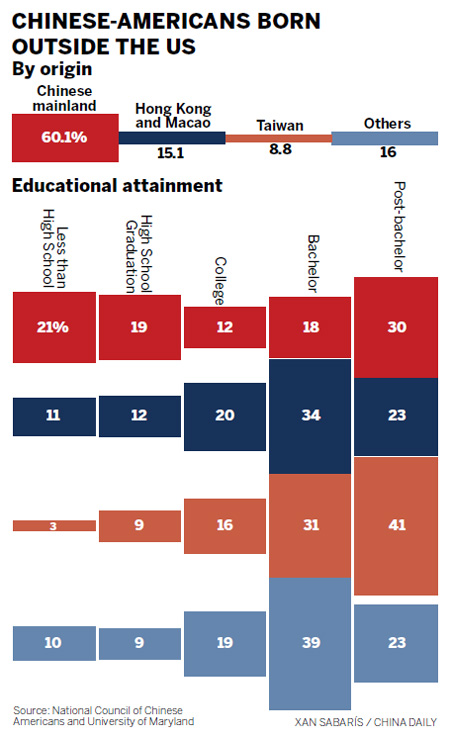Younger Chinese-Americans earning less
"Tiger Mother" Amy Chua may be right about her approach to educating her daughters as a recent report shows that the younger generation of Chinese-Americans are earning less than their predecessors.
The report "A New Profile of Chinese-Americans in a New Century", so far the most complete study about Chinese-Americans, reveals that, contrary to popular perceptions, Chinese-Americans do not earn higher incomes with each successive generation.
The "1.5 generation", Chinese-Americans born outside the United States and mainly educated in the country, receive the highest returns on their educational levels of any generation.
The profile of the oldest and largest Asian-American community, sponsored by the National Council of Chinese-Americans (NCCA) and published on Thursday, is based on the latest information from the United States Census Bureau.
It includes information on the recent changes in population, education, income, intermarriage and generational shifts.
Larry Hajime Shinagawa, director of the Asian American Studies Program at the University of Maryland and the author of the report, said the combination of two cultures and the drive to survive and succeed in a new country contributed to the achievements of the "1.5 generation".
"But there is an education and income decline among generations, especially among Asian Americans," he added.
The reasons may be complicated, he said, but the generations born in the US usually lack that strong drive for success that their parents or grandparents had.
Amy Chua, the author of the controversial memoir Battle Hymn of the Tiger Mother and a professor at Yale Law School, has sparked a heated debate on Chinese mothers' strict education methods. The reason, as she told a Chinese newspaper earlier this month, is that many Chinese immigrant parents like her are worried that their children will not work as hard as they did because of their comfortable life in the US.
But Keni Casey, a typical "1.5 generation" Chinese-American and a mother, believes that it is the family environment that determines the achievement of the children.
"Some second or third generation Chinese kids are doing really good, but some are just so-so," she told China Daily. "It largely depends on their family education."
Casey grew up in Hong Kong and came to the US at 20 for her college education. Her son has got offers from several US top law schools.
"It is for sure that my son will be more successful than me," she said. "I have given him all my care and support and respected his interests."
Han Qingyuan, who came to the US from Chinese mainland in the 1980s and got a PhD in engineering, said the younger generations now have opportunities to follow their own interests and not the money.
"Our generation had no choice but to study and work very hard in order to make a living," he said. "Our kids have more choices than we did even though they are making less money."
Another finding of the report is somewhat disappointing. Going to Ivy League universities and collecting degrees is often considered the passport to a well-off life by many Chinese-Americans, but the report shows that their huge educational investment may yield much lower returns than those by their peers from different ethnic groups.
Chinese-Americans consistently make lower incomes than non-Hispanic whites in every level of education.
Census data shows that Chinese men earn $5,000 to $15,000 less in annual income than white Americans who have had the same level of education, while Chinese women's situation is better as those with higher than a high school diploma even earn more than their white peers.
For instance, Chinese-Americans with a bachelor degree earn $55,571 annually, lower than the general population's $59,344, and non-Hispanic whites make $62,185.
"Interestingly, after age 35, Chinese women begin to get paid less than white women due to gender, racial and maybe family factors," said Shinagawa.
 |
 0
0 






